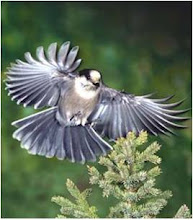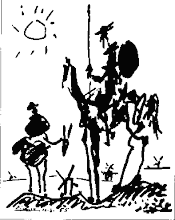The CBC Thunder Bay is running a Facebook forum they're calling the Common Ground Cafe . It concerns itself with the improvement of relations between the Anishnaabeg and the rest of the folks who share space in Thunder Bay. From the postings, there seem to be a lot of very sincere, well meaning people who would like things to be different in the City, but my Gawd! are they ever naive!? If wishes were horses, the custodial staff at CBC Thunder Bay would be doing a lot of shovelling.
Although we might all wish it were different, the hard reality in this world is that respect will only be received and maintained by First Nations and First Nations people when it is demanded. All these good intentions are actually a big part of the problem because consideration of the Anishnaabeg is almost universally asked for or granted on the shaky basis of guilt or pity or worse, on the basis of self-serving concern for tax dollars or 'safety in the community' ...(read: safety for the white folks.) But sympathy, charity and self-interest are not the basis for the perpetual, respectful partnership demanded by our Treaties.
Some of these hand-wringing liberals are frigging dangerous! Here's one from a middle aged white guy:
_____________
Lorne Mayer 27 November 11:17 Jody, you ask about improving race relations. Not using the word "race" would be good for starters. Race implies concrete differences between different people.
_____________
Lorne Mayer's thinking is precisely why we need to move this conversation out of the realm of "race relations."
Dear Mr. Mayer,
Regarding your suggestion to not use the word "race" and ignore concrete differences.
As a fellow, privileged, white male I feel I must send up the alarm that your suggestion to deny concrete differences in our corner of confederation can actually kill people. Thirty plus years in the field of human rights and Aboriginal relations has been long enough for me to witness this tragedy unfold. Here’s how it can work:
The empowered majority claims that we are all the same, that we should all be equal …that there should be no such thing as racial difference in our territory.
1. This effectively ignores the legacy of cultural genocide, (-and there are no other words to accurately describe the terrible intentionality of these acts,) perpetrated by privileged white males on our country’s original nations/races. Witness: Residential Schools, Indian Act, definition of persons, land takings, etc. etc. etc.
Playing down or ignoring our racial history sends the message that one group's horrific racial experience is really not worth considering.
Some results from this sort of denial?
• The claim of equal opportunity and equal capacity is made frustratingly hollow by ignoring the real human consequences of over a century of prolonged, intentional, racial attack.
• Further marginalization and further insult paid to an identifiable racial group,
• Anger and/or a diminished feeling of worth in individuals and an inclination to hold on even more tenaciously to racial identity.
2. Saying there is no such thing as race also ignores the unique and constitutionally protected rights and interests of inherent Aboriginal Nations/races. This blindness of the ‘haves’ to race-based rights allows non-Aboriginal governments and their privileged, non-Aboriginal constituencies to stand silently by while their companies move in to remove even more resources from Treaty lands.
Denial of race means that nations (races) who are recognized as sovereign peoples in our treaties and who should be directly involved in the use of the resources in their national territories, can be dismissed with demeaning tokenism as mere "interest groups" -equal to, and of no more consequence than the local tree huggers' club.
Applied elsewhere, such a denial of race-based constitutional rights would be the equivalent of ignoring French law and French language in Quebec.
Some results:
. Further political and economic marginalization.
• Often, physical dislocation of people and even whole communities to more urban centres as environmental and economic refugees.
• A loss of connection with place, language, family and culture.
• A sense of helplessness, despair and a feeling of being disrespected.
• More anger and further alienation from the privileged, non-aboriginal communities that have benefited from Aboriginal displacement.
I expect it’s fairly clear where this is leading. In short, a denial of legal, race-based, constitutionally protected differences is a rejection of who Aboriginal people are in Canada. It can lead directly to having a growing number of legitimately pissed off, alienated and economically marginalized people either stewing in their now, non-sustainable communities or leaving their homelands and moving in next door in urban settings. Judging from your picture, such displaced, alienated folks are not much of a statistical danger to you or your family. But denial of important race-based differences does kill communities and, if the life-expectancy stats are accurate, it kills precisely that racial group whose uniqueness you would deny.
Having witnessed the denial of difference imposed on the Anishnaabeg over the years, the remarkable thing for me is that so many Aboriginal people, despite the past genocide, despite the fact that their distinctive gifts and special place in confederation is consistently ignored by their treaty partners, still, so many of these amazing people remain willing and able to contribute to our shared community with such grace and generosity.
We are different, Mr. Mayer; racially, historically and constitutionally. Get used to it. Respect it.
The unique vision of Canada is that we say we are committed to the accommodation of differences - regional, legal, racial, linguistic. It's worth noting that one of Canada's preeminent thinkers, John Ralston Saul, recently figured out that this idea for our country -the idea of a society based on the accommodation of difference, does not even come from culturally monolithic Western European thinking. Guess what! He concluded that the concept of diverse peoples successfully functioning in an inclusive circle is an aboriginal one.
Vive la différence!

